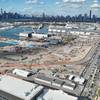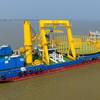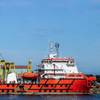Woodfibre LNG, Canada's first liquefied natural gas export project, will be a "nice-to-have" fillip for the country's gas producers but does not signal the start of a west coast LNG boom, industry watchers said on Monday.
Privately held Woodfibre LNG Ltd said on Friday it will start building its C$1.6 billion ($1.2 billion) project in Squamish, British Columbia, next year after its Singaporean parent company authorized the funds last week.
It is the first of more than a dozen LNG projects proposed for British Columbia to get the final go-ahead, but analysts say Woodfibre is unlikely to herald an investment surge from other developers given the challenging economics of an oversupplied LNG market.
"I think it's a one-off," said Wood Mackenzie analyst Dulles Wang, adding the structure of Woodfibre made the investment decision easier. "Woodfibre is a private company, they are funding this project by themselves and they are not looking to the debt or equity markets for financing."
The other two perceived 'front-runner' LNG projects are still awaiting the green light from the companies behind them.
Canada approved Malaysian state-owned oil company Petronas' Pacific NorthWest LNG project in September, but the company has yet to approve final funding. Royal Dutch Shell deferred an investment decision on its LNG Canada project in July.
"The biggest hurdle facing both of them is still cost and oversupply," said Raymond James equity analyst Chris Cox. "Given how oversupplied the LNG market is, it's tough to make the economics work for a project of that size."
The Petronas and Shell projects, at 12 megatonnes per annum (mtpa) and 24 mtpa, respectively, dwarf Woodfibre's 2.1 mtpa capacity.
This means a boost to western Canadian natural gas prices will be limited, said AltaCorp Capital analyst Dirk Lever. He forecast Woodfibre will consume about 0.3 billion cubic feet a day (Bcf/d) of gas, out of total Canadian production of 14.5 Bcf/d.
"It's a positive, but it's not huge volumes," Lever said. "If this is the only one that goes forward it's not going to make a dent."
Woodfibre is one of the few projects that does not have dedicated reserves and will instead buy gas from northeastern British Columbia in the open market.
Canadian benchmark natural gas prices have slumped in recent years because of oversupply, while the U.S. shale gas boom cut demand from Canada's sole customer.
($1 = 1.3372 Canadian dollars)
(By Nia Williams; Editing by Steve Orlofsky)














